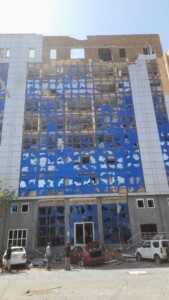UNSC extends mandate of Sudan assistance mission UNITAMS for a year
The United Nations Security Council (UNSC) has extended the mandate of the United Nations Integrated Transition Assistance Mission in Sudan (UNITAMS) until June 3, 2023. The mission, which replaced the United Nations-African Union Mission in Darfur (UNAMID) peacekeeping force, to assist Sudan “in its transition towards democratic governance, provide support for peace negotiations and bolster efforts to maintain accountable Rule of Law and security institutions”.
 UNITAMS head Volker Perthes addresses the UNSC last week (Photo: UN)
UNITAMS head Volker Perthes addresses the UNSC last week (Photo: UN)
The United Nations Security Council (UNSC) has extended the mandate of the United Nations Integrated Transition Assistance Mission in Sudan (UNITAMS) until June 3, 2023. The mission, which replaced the United Nations-African Union Mission in Darfur (UNAMID) peacekeeping force, to assist Sudan “in its transition towards democratic governance, provide support for peace negotiations and bolster efforts to maintain accountable Rule of Law and security institutions”.
The decision passed by the UNSC in New York yesterday extends the initial UNITAMS mandate, which is due to expire on June 3, 2022, until June 3 2023 “as contained in paragraph 3 of resolution 2579 (2021)“.
UNITAMS was established in June 2020 with stated objectives “to assist Sudan in its transition towards democratic governance, provide support for peace negotiations and bolster efforts to maintain accountable Rule of Law and security institutions”.
This occurred as the African Union-United Nations Hybrid Operation in Darfur (UNAMID) completed its drawdown exercise on 30 June 2021, as stipulate in UN Security Council resolution 2559 (2020), which ended the Mission’s mandate.
In his latest report to the UNSC on May 25, Volker Perthes, UN Special Representative for Sudan, and head of UNITAMS said: “Time is short for Sudan to reach a solution to its protracted political crisis,” warning that if the impasse is not urgently overcome, the consequences will be felt beyond national borders, impacting a whole generation.
“The crisis facing Sudan is entirely homegrown and can only be resolved by the Sudanese,” Perthes said.
Outlining developments since his last briefing to the UNSC in March, which also highlighted that “Time is not on Sudan’s side“, Perthes that he said authorities have released 86 detainees across the country, including high profile officials affiliated with the work of the Dismantling Committee and activists from the Resistance Committees.
In the past months, UNITAMS has facilitated the ‘Trilaterl Mechanism in cooperation with the African Union and Intergovernmental Authority on Development (IGAD). The trilateral mechanism, which was launched on Thursday, May 12, and has since held talks with actors across the political spectrum in Sudan.
Some rebel movements and protest groups, including the Forces for Freedom and Chance – Central Council and the Resistance Committees of Khartoum, refuse to participate in any dialogue with the military coup authorities and those who support them as they fear that this will legitimise the coup. Others, such as the Sudan Revolutionary Front (SRF), have called on the revolutionary parties to make concessions and engage in the dialogue.
Relations between the government of Sudan and UNITAMS have been strained recently, following Perthes’s March briefing lamenting Sudan’s deteriorating economic, humanitarian, and security situation.
As retort, the Sudan Ministry of Foreign Affairs said that UNITAMS “should focus on the other basic aspects of its mandate, instead of focusing most of its activities on only the political side”.
The head of Sudan’s ruling junta, Gen Abdelfattah El Burhan, subsequently threatened to expel Perthes from Sudan, accusing him of “overstepping the mandate of the UN mission” and interfering in Sudanese affairs.











 and then
and then